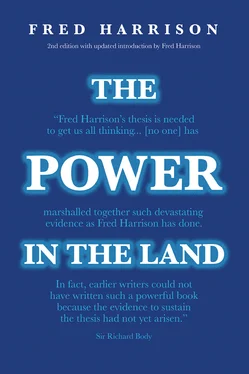1 ...8 9 10 12 13 14 ...21 Walls touched on the essence of the problem when he noted that the introduction of a free market in property ‘would be very welcome from the point of view of economic efficiency but could be disastrous for some property investors’. 15 The point was well understood by Hammerson, one of the major British property companies whose chairman, Sydney Mason, was quoted in 1977 as stating: ‘I would rather have our planning restrictions and no competition’. In 1982, Hammerson raised £70m. through the issue of new shares, while successfully concealing the value of its assets. Walls noted with an evident sense of disbelief:
I do not know in that particular case which is worse — Hammerson’s continued refusal to let its shareholders know what the real value is of what they own, or the Stock Exchange’s surprisingly relaxed attitude in letting Hammerson make yet another rights issue without again revaluing its portfolio, or the auditors who can carry on signing an audit certificate (presumably with a straight face) which says that the accounts ‘give a true and fair view of the state of affairs of the company and the group’ when the property portfolio is stated in the balance sheet at cost and the directors’ valuation of the portfolio deliberately excludes the entire reversionary potential of the portfolio. 16
The indifference towards the influence of land monopoly on the industrial economy is only too apparent; this indifference actually masks a positive discrimination in favour of the interests of the landed class.
Governments direct their policies in favour of supporting rental income. 17 An historical example from the rural sector is the use to which the British Parliament put the Corn Laws. These imposed duties on imported wheat. By restricting international trade, domestic prices rose and ensured high land values and rental income. Adam Smith would presumably have approved of this policy, for it culminated in what he deemed to be ‘the greatest of all public advantages’ — even though the policy directly contradicted his strictures against trade protectionism. After 1815, and towards the end of the Corn Law period in the 1840s, the effect on consumers was serious; average prices were higher, and the extreme prices were occasionally very much higher, than they would have been if people had been free to eat foreign-grown wheat. 18
The consequences were serious at the levels of both households and the economy. For example, the Commission on Hand-loom Weavers found evidence that the greatest grievance of the weavers was the price of food. As a result of the high proportion of their wages which they were forced to spend on food, ‘their power of purchasing clothes was curtailed, and the home demand for manufactures was checked’. 19 A similar restrictive effect on international trade was felt. Potential customers in foreign lands could not buy goods made in Britain because they could not sell their wheat on the British market.
A contemporary example from the USA is the practice of funnelling federal government money to farmers as an inducement to set aside land and reduce the output of food. This keeps food prices high and retards the living standards of consumers (who would otherwise spend less on food, and more on durable goods). The value of land, moreover, is increased above its competitive market level, which is the ultimate effect of official policy. 20
An identical effect on social welfare is achieved by the decisions made by individual land monopolists. An example from the urban sector neatly illustrates how speculation restricts economic growth.
Economists traditionally assume that the ceiling on output is set by the rate of growth of population, technical progress and the accumulation of capital; land monopoly is ignored as a brake on the economy. At a London meeting of the Underground Railway Group in February 1927, Lord Ashfield complained bitterly that the Edgware extension of the London Electric Railway had continued to develop its traffic ‘at a slower rate than was anticipated’. Why? He offered an explanation: land speculation at the Edgware terminal had forced up prices to a level which restricted purchases. ‘This is an evil which besets all railway enterprise,’ he declared, and he proposed as a remedy ‘some means by which the increment in the value of the land could be appropriated to pay some share of the enormous cost attending the construction of Underground Railways in Greater London’.
The following year, Lord Ashfield’s complaint was investigated by the Liberal Party’s Industrial Inquiry, the committee of which included Lloyd George and John Maynard Keynes. They reported:
Lord Ashfield’s suggestion applies not only to London and not only to railway undertakings. It applies to all major transport undertakings, and public improvements in every part of the country. The increase in land values might in some cases pay the whole cost of the development and in all cases a large part of it. 21
This was a familiar story: public expenditure on improved transportation — to cut the costs of travel and extend the range of living and working environments — pushed up land values. This, in itself, is not a weakness of the economic system, provided that the price of land was not forced above the economic surplus — the real rental value of land proportionate to the current output of wealth. Under the present arrangements, however, not only are the socially-created increases in land values privately appropriated, but the monopolistic structure of the land market encourages speculators to force up their asking prices to speculative levels, consequently retarding the process of capital formation and economic growth.
The vital conclusions ought to be obvious, but they have been ignored. Where capitalists cut costs and increase efficiency, land monopolists serve their interests best by increasing costs and decreasing overall efficiency. Where capitalism raises consumer satisfaction by extending the range of goods and services at lower prices, land monopoly restricts the choice and raises prices. This outcome arises inevitably from the simple truth that the pursuit of speculative rents can reward the monopolists only by curtailing general welfare.
But vacant sites are not the only manifestation of a malfunctioning land market. Monopoly can produce economic inefficiency even when owners use their land. For monopoly enables landowners to conceal entrepreneurial inefficiency. If, for instance, the performance of a firm is inadequate to pay wages at the ruling rates, interest on capital investment and rent to land, the proprietors can delude themselves by foregoing the economic rent which they ought, as a bookkeeping exercise, to impute to themselves as land- owners. What usually happens is that they pay wages and interest, and disregard rental income. While this situation may be tolerable to the owner- occupying entrepreneurs, resources are not being used to their best advantage so far as the economy is concerned. Output, and therefore welfare, is not being maximised.
Assume that the firm is in a shrinking industry. Competing firms (which rent their land) have to close down or switch to producing goods or services which the consumers want, and for which they are willing to pay a price yielding sufficient returns to justify the employment of all the factors of production. The stark reality of this position can be hidden from the firm which owns its land. Their day of judgment is deferred. But as a result, firms which want to expand in new directions cannot use the land, labour and capital which are tied up in the redundant firm or industry: artificial shortages constrain the aggregate growth of the economy. The inefficient allocation of resources would be quickly terminated by the imposition of a land tax on market-imputed rental income. If a firm was unable to pay that tax and meet its wages bill and returns to capital, it would have to change to some other, more desirable and remunerative activity.
Читать дальше












